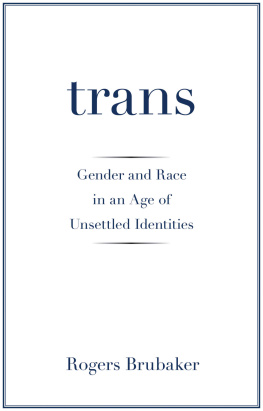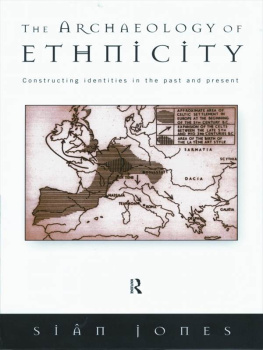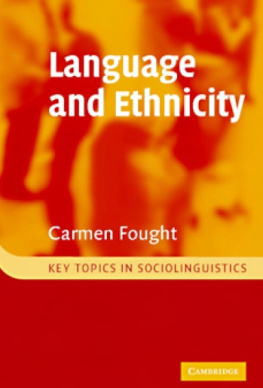Rogers Brubaker - Ethnicity without Groups
Here you can read online Rogers Brubaker - Ethnicity without Groups full text of the book (entire story) in english for free. Download pdf and epub, get meaning, cover and reviews about this ebook. year: 2004, publisher: Harvard University Press, genre: Politics. Description of the work, (preface) as well as reviews are available. Best literature library LitArk.com created for fans of good reading and offers a wide selection of genres:
Romance novel
Science fiction
Adventure
Detective
Science
History
Home and family
Prose
Art
Politics
Computer
Non-fiction
Religion
Business
Children
Humor
Choose a favorite category and find really read worthwhile books. Enjoy immersion in the world of imagination, feel the emotions of the characters or learn something new for yourself, make an fascinating discovery.

- Book:Ethnicity without Groups
- Author:
- Publisher:Harvard University Press
- Genre:
- Year:2004
- Rating:3 / 5
- Favourites:Add to favourites
- Your mark:
- 60
- 1
- 2
- 3
- 4
- 5
Ethnicity without Groups: summary, description and annotation
We offer to read an annotation, description, summary or preface (depends on what the author of the book "Ethnicity without Groups" wrote himself). If you haven't found the necessary information about the book — write in the comments, we will try to find it.
Ethnicity without Groups — read online for free the complete book (whole text) full work
Below is the text of the book, divided by pages. System saving the place of the last page read, allows you to conveniently read the book "Ethnicity without Groups" online for free, without having to search again every time where you left off. Put a bookmark, and you can go to the page where you finished reading at any time.
Font size:
Interval:
Bookmark:
Ethnicity without Groups
ROGERS BRUBAKER
HARVARD UNIVERSITY PRESS
Cambridge, Massachusetts, and London, England
Copyright 2004 by the President and Fellows of Harvard College
All rights reserved
Printed in the United States of America
First Harvard University Press paperback edition, 2006
Library of Congress Cataloging-in-Publication Data
Brubaker, Rogers, 1956
Ethnicity without groups / Rogers Brubaker.
p. cm
Includes bibliographical references and index.
ISBN13 978-0-674-01539-5 (cloth)
ISBN10 0-674-01539-8 (cloth)
ISBN13 978-0-674-02231-7 (pbk.)
ISBN10 0-674-02231-9 (pbk.)
1. Ethnicity. 2. Assimilation (Sociology) 3. Nationalism. 4. Ethnic conflict.
5. Cognition and culture. I. Title.
GN495.6.B77 2004
305.8dc22 2004047343
For Benjamin and Daniel
The UCLA Sociology Department has been not only an institutional but an intellectual home. Special thanks go to Roger Waldinger for suggesting this project, and for always-trenchant critical feedback. The exacting experience of studying conversation analysis with Manny Schegloff drew me in unanticipated and richly rewarding directions. Manny, Mara Loveman, Peter Stamatov, and Andreas Wimmer provided useful critical comments on early versions of several chapters. Working closely with Jon Fox, Liana Grancea, and Margit Feischmidt on a sustained empirical project while these essays were being conceived and written informed my thinking on a number of analytical issues. Rob Jansen contributed a helpful reading of the manuscript as a whole, and also helped prepare the index. Elizabeth Lynn provided efficient assistance with the final preparation of the manuscript. And Zsuzsa Berend has once again been an unfailingly perceptive reader and critic.
I am grateful to a number of friends and colleagues at other institutions for helpful critical feedback, and for arranging forums that allowed me to try out and sharpen my ideas. I cannot name them all, but I would like to thank Sorin Antohi, Elenra Babejov, John Bowen, Craig Calhoun, Kanchan Chandra, John Coakley, Roy DAndrade, Istvn Dek, Susan Gal, Francisco Gil-White, Manu Goswami, Chris Hann, David Hollinger, Christian Joppke, Victoria Koroteyeva, David Laitin, Jennifer Lee, Steven Lukes, Jitka Malekov, Lszl Nemnyi, Jeffrey Olick, Michael Schudson, John Skrentny, Loc Wacquant, Peter Waldmann, Robin Wilson, and Daniel Wolk.
For generous institutional support, I would like to thank the Center for Advanced Study in the Behavioral Sciences, the National Science Foundation (Grant No. 9458329), the MacArthur Foundation, the John Simon Guggenheim Foundation, the Comparative Immigration and Integration Program of the University of California Center for German and European Studies, the UCLA Center for Comparative and Global Research, and the UCLA Academic Senate.
For this volume, I have taken the opportunity to make a number of minor changes to the essays, eliminating some repetition, updating some information, and correcting some errors and infelicities. Given the burgeoning literatures on the subjects addressed here, it has not been possible to engage in a serious way studies that have appeared since the essays were written, though I have added some references to new work. References have been consolidated into a single integrated bibliography.
Studies in Society and History 44[4] (October 2002): 70044.
The essays collected in this volume address a cluster of closely related themes: ethnicity, race, nationalism, ethnic violence, identity, collective memory, migration, assimilation, and the nation-state. These are issues that, in one form or another, have preoccupied me for nearly two decades. Yet the present essayswritten in analytical counterpoint to sustained ethnographic research, and in critical engagement with contemporary theoretical debatesmark a new direction in my work.
My earlier work on immigration, citizenship, and the nation-state in France and Germany (1992) and on the interplay between nationalizing states, national minorities, and external national homelands in eastern Europe (1996) involved what Charles Tilly (1984) has called big structures, large processes, [and] huge comparisons. The latter project, for example, embraced three sprawling multinational empiresHabsburg, Ottoman, and Romanovand their successor states, two of whichthe Soviet Union and Yugoslaviawere themselves multinational (and on some accounts imperial) states, whose disintegration yielded another score of successor states. In the course of this work, I began to experience a tension between my emerging theoretical commitments, which pointed increasingly in a microanalytic direction, and the scale and scope of my empirical work.
In response to this tension, I began in the summer of 1995 to conduct fieldwork in the ethnically mixed Transylvanian town of Cluj, whose flamboyantly nationalist Romanian mayor had earned considerable notoriety for his anti-Hungarian pronouncements and his unflagging crusade to nationalize the towns public space. Together with Jon Fox, Margit Feischmidt, and Liana Grancea, I have been studying the meanings, workings, and variable salience of ethnicity (or nationality, as it is called in the region) in everyday life, and the ways in which such everyday ethnicity is both affected by and insulated from nationalist politics on local, statewide, and interstate levels (Brubaker et al. 2004).
Working in Cluj, I have come to appreciate the force of Eric Hobsbawms (1990: 10) dictum that nationhood and nationalism, while constructed from above, cannot be understood unless also analysed from below, that is in terms of the assumptions, hopes, needs, longings and interests of ordinary people, which are not necessarily national and still less nationalist. Studying the everyday preoccupations of ordinary Clujenito which ethnicity is indeed largely irrelevanthelped make sense of certain puzzles: in particular the lack of popular mobilization in response to, and the considerable popular indifference in the face of, intense and intractable elite-level nationalist conflict.
Yet this nonresponsiveness to the appeals of ethnonational entrepreneurs does not mean that ethnicity is experientially insignificant in Cluj. Social life is pervasively, though unevenly, structured along ethnic lines, and ethnicity happens in a variety of everyday settings. Ethnicity is embodied and expressed not only in political projects and nationalist rhetoric but in everyday encounters, practical categories, commonsense knowledge, cultural idioms, cognitive schemas, interactional cues, discursive frames, organizational routines, social networks, and institutional forms. Such everyday ethnicitylike what Michael Billig (1995) has called banal nationalismmay be invisible to the student of collective action or ethnic violence, but it merits study in its own right.
Although they do not, with one exception, directly engage my work as entities and cast as actors.
The second target is complacent and clichd constructivism. Social construction has been a fertile metaphor in recent decades, inspiring a large body of work that has enriched and transformed our understanding of ethnicity (and of many other phenomena). Yet by virtue of its very success, the constructivist idiom has grown weary, stale, flat, and unprofitable. Once an insurgent undertaking, a bracing challenge to entrenched ways of seeing, constructivism has become the epitome of academic respectability, even orthodoxy. It is not that the notion of social construction is wrong; it is rather that it is today too obviously right, too familiar, too readily taken for granted, to generate the friction, force, and freshness needed to push arguments further and generate new insights. One symptom of this intellectual slackness is that one often finds constructivist and groupist language casually conjoined.
Next pageFont size:
Interval:
Bookmark:
Similar books «Ethnicity without Groups»
Look at similar books to Ethnicity without Groups. We have selected literature similar in name and meaning in the hope of providing readers with more options to find new, interesting, not yet read works.
Discussion, reviews of the book Ethnicity without Groups and just readers' own opinions. Leave your comments, write what you think about the work, its meaning or the main characters. Specify what exactly you liked and what you didn't like, and why you think so.








